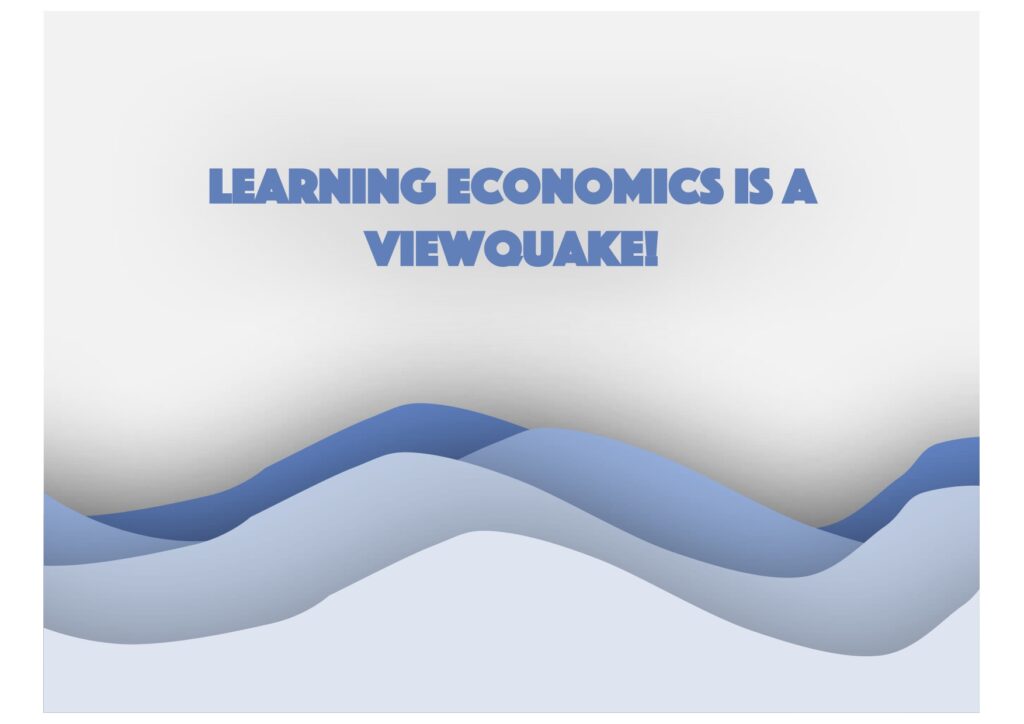Markets: beyond AI
 |
| A. Introduction |
| What if I told you that we have access to a technology that generates, aggregates and communicates a vast array of information in a single and simple to understand metric? That throughout human history we have experimented with, developed and deployed institutions that convert a multitude of different perspectives into a common, universal language? And, perhaps most importantly, that our intuitions about it are usually wrong? This unit gives you the ability to recognise the beauty and power of market prices and see your business environment in a whole new way. We will consider the social function of markets and their impact on facilitating an extended order of cooperation. We will also consider the key challenges that business practitioners will need to overcome to ensure that humanity continues to reap the rewards of one of our greatest collective accomplishments.
Markets don’t approach or have the capacity to exceed human intelligence, they are even better than that – they are a virtual collective intelligence. This short course intends to convince you of this remarkable claim. And, to demonstrate that I’m not a luddite, it is the only course I teach that deliberately incorporates AI generated content (the images above!) *** This website collects a range of resources for you to work through at your own pace. But if you take the in person version: Part 1 of the lecture handouts can be downloaded here. Part 2 of the lecture handouts can be downloaded here. |
| B. The foundational texts |
In this part of the course you should become familiar with four key foundational texts that articulate the majestic properties of markets.
To make things easier, I have republished them all in a single PDF file: Download the reading pack here. Here are short video explanations of the four key readings: Origin of Money, by Carl Menger The Use of Knowledge in Society, by FA Hayek I, Pencil, by Leonard Reed Seen vs Unseen, by Frederic Bastiat Test your knowledge of each reading with these four assignments: There is also a combined Kahoot! quiz for the in person version. |
| C. The modern relevance |
| Here is the trailer for Arrival (2016), which you should watch in full if you can.
Read: Catching Crumbs from the Table, by Ted Chiang, 2000 (Nature, 405, 517) Chiang’s work of science fiction takes place in a world where AI have grown beyond human’s ability to comprehend them, and scientific endeavour is simply an attempt to interpret what “metahumans” are doing. In this world, these intellectually superior beings are benign (he pointedly comments that “unlike most previous low technology cultures confronted with a high technology one – humans are in no danger of assimilation of extinction) but have no interest in communicating effectively with people like us (and indeed when you consider our attempts to explain scientific progress to ants, why should they?). He considers a technology that might help individuals to upgrade their cognitive capabilities to bridge this divide, but recognises that people are quite cautious about exposing children to any gene therapy that might lead towards assimilation. His vision is a technologically optimistic one, but where humans are resigned to “catching crumbs from the table” – to feed off the scraps of our superior machines, where our attempt to merely interpret and make sense of their findings is our limit. Read: Catching Crumbs from the Market, by Ben Southwood, 2022 In his attempt to understand the financial market reaction to the UK government’s infamous mini-budget in September 2022, Ben Southwood (an Editor at Stripe Press, and a friend of mine) explains his affection for Chiang’s article. In doing so, he asks “Aren’t we already catching crumbs from the table?” Indeed, as the readings above demonstrate, the information content provided by market exchange is not always given to us in an entirely intelligible manner. We must interpret market data, and indeed speculate on what it means. Markets are arenas for such speculation to take place, and for contested claims to confront reality. Unlike an artificial intelligence, markets are a product of of human action, but they are not of human design. Markets help to assimilate dispersed and fragmented information into a single figure, which relates to an entire constellation of price signals. This communication system helps us to act and to plan, without having to understand where it has come from or what has happened to make it change. The implications are clear, but the interpretation is not. We struggle to make sense of what we see, despite the awe we should have for the system. *** I remember hearing someone describe markets as “the first AI” and being impressed, but unconvinced by that declaration. Indeed here are some examples of people making an explicit link between markets and artificial intelligence. Firstly, Brad DeLong: “There is no better way for harnessing the eight-billion-brain anthology intelligence of humanity to achieving the social goals we all want, other than to organize a well-functioning market system. That is a basic and serious truth.” Brad DeLong (Conversations with Tyler. A similar quote can be found in his book ‘Slouching Towards Utopia’, 2022, p. 515) And consider this quote by Paul Seabright (The Company of Strangers, 2004, p.15): “Citizens of the industrialized market economies have lost their sense of wonder at the fact that they can decide spontaneously to go out in search of food, clothing, furniture, and thousands of other useful, attractive, frivolous, or life-saving items, and that when they do, somebody will have anticipated their actions and thoughtfully made such items available for them to buy. For our ancestors who wandered the plains in search of game or scratched the earth to grow grain under a capricious sky, such a future would have seemed truly miraculous, and the possibility that it might come about without the intervention of any overall controlling intelligence would have seemed incredible. Even when adventurous travelers opened up the first trade routes and the citizens of Europe and Asia first had the chance to sample each other’s luxuries, their safe arrival was still so much subject to chance and nature as to make it a source of drama and excitement as late as Shakespeare’s day.” Mark Zuckerberg talks about how stock markets resemble AI here:
But markets go way beyond an “artificial” intelligence. It is much more magnificent and mysterious: it is a virtual collective intelligence. One of the oldest in the world, and one of the most sophisticated social tools that man has ever created, our steps into the digital future might be trodden along a familiar path. How we understand and utilise markets are a useful way to practise and anticipate our relationship with the coming AI revolution.
“The market” isn’t a god or a weapon. It is neither something to worship nor something to deploy. It is an emergent and spontaneous order that helps us to solve social problems. |
| D. Markets in the age of AI |
| But what about the implications of AI for markets? Might modern technologies make markets obsolete? A hot topic in economics is whether improvements in big data and/or AI might alter the outcome of the socialist-calculation debate. Steve Horwitz explains that debate here:
The best book to read about the socialist calculation debate is:
Recent literature includes:
In 2024, Peter Boettke, Rosolino Candela, and Tegan Truitt published a book on the ongoing relevance of The Socialist Calculation Debate. A key quote: “Effective allocation of resources requires that there is a correspondence between the underlying conditions of tastes, technology, and resource endowments, and the induced variables of relative prices, quantities, and methods of production” (p.37) According to a 2024 working paper by Cass Sunstein, “In important respects, the Socialist Calculation Debate and the AI Calculation Debate are the same thing.” My view is that calculation problems can’t be solved through computation, and anyone who thinks that socialism is feasible either hasn’t read, or hasn’t understood, the four articles mentioned in this unit. Boettke et al (2024) write, “the whole point is that this has never been a computation problem. The knowledge is not “out there” and difficult to collect, but emergent only with the process itself and outside that context does not exist (p.60). As Martin Wolf has said, “Even in the age of big data, markets exploit knowledge and adjust incentives in ways that no other social media mechanism does” Martin Wolf (2023, p. 225) Indeed, this isn’t a new debate at all. Good examples of papers claiming that AI or big data could replace markets include:
And good rejoinders include:
Other shorter contributions to this debate include comments by: Here is a video on this topic featuring Bob Murphy:
Finally, in January 2025 the sudden popularity of Chinese AI app DeepSeek prompted a slump in US tech stocks. Read this BBC News report and consider the important role that market prices play in explaining what happened and why. |
| E. Conclusion |
| Markets are robust and powerful and in many cases using markets to try to solve a problem will make a massive contribution to actually doing so. What’s more, since most people’s intuitions about markets are wrong, we have immense potential to not only change people’s view of the world but also discover an important social tool.
This often constitutes a viewquake! |
| F. Testimonials |
| “Markets: Beyond AI” was a resounding success, perfectly aligning with our mission by blending academic depth with practical relevance. Anthony expertly unraveled the complexities of market dynamics, illustrating how prices act as a vital mechanism for encapsulating intricate economic data to guide decision-making and spur innovation. His talent for making such a nuanced concept accessible and interactive was highly impressive. The workshop inspired and educated in equal measure.
Javier Gonzalez, Dept. of Economics, Universidad de Sonora, Hermosillo |
| G. References |
| Wolf, M., 2023, The crisis of democratic capitalism, Allen Lane
DeLong, J. B., 2022, Slouching towards utopia, Basic Books |

